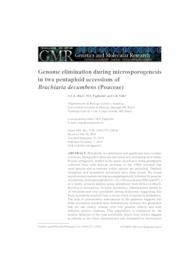Genome elimination during microsporogenesis in two pentaploid accessions of Brachiaria decumbens (Poaceae).
Genome elimination during microsporogenesis in two pentaploid accessions of Brachiaria decumbens (Poaceae).
Author(s): RICCI, G. C. L.; PAGLIARINI, M. S.; VALLE, C. B. do
Summary: Polyploidy is a prominent and significant force in plant evolution, taking place since ancient times and continuing until today. Recent cytogenetic studies in the genus Brachiaria using germplasm collected from wild African savannas in the 1980s revealed that most species and accessions within species are polyploid. Diploid, tetraploid, and pentaploid accessions have been found. We found asynchronous meiosis during microsporogenesis, followed by genome elimination, in two pentaploid (2n = 5x = 45) accessions (D53 and D71) of a hardy, invasive pasture grass, introduced from Africa to Brazil, Brachiaria decumbens. In these accessions, chromosomes paired as 18 bivalents and nine univalents during diakinesis, suggesting that these accessions resulted from a recent event of natural hybridization. The lack of chromosome associations in the genomes suggests that these accessions resulted from hybridization between two genotypes that are not closely related, with low genome affinity and with different meiotic rhythms. This supposition is reinforced by the meiotic behavior of the nine univalents, which were always laggard in relation to the other chromosomes and eliminated as micronucleiin microspores. The behavior of these accessions, which have an odd level of ploidy and confirmed genome elimination, supports the general assumption that a polyploid accession can undergo a new event of polyploidization by natural hybridization (neopolyploidyzation). This evidence for natural hybridization in Brachiaria shows that this is a wild genus in an ongoing evolutionary process.
Publication year: 2010
Types of publication: Journal article
Unit: Embrapa Beef Cattle
Observation
Some of Embrapa's publications are published as ePub files. To read them, use or download one of the following free software options to your computer or mobile device. Android: Google Play Books; IOS: iBooks; Windows and Linux: Calibre.
Access other publications
Access the Agricultural Research Database (BDPA) to consult Embrapa's full library collection and records.
Visit Embrapa Bookstore to purchase books and other publications sold by Embrapa.

